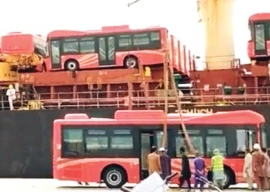
Young minds analysed national policies and put forward their research-based solutions for future policy-making in a session of the sixth Youth Parliament Pakistan (YPP).
Five representatives of the YPP’s standing committee on national security, finance, law justice and human rights, foreign affairs and education presented their findings on Tuesday in a session at a private hotel.
Criticising the National Internal Security Policy, Moazzam Habib said the Interior Ministry failed to provide a strong base on which an effective policy could be drafted.

“The policy fails to answer important questions including lack of coordination among intelligence agencies, insurance of safe borders, lack of an effective media policy from an internal security perspective, sectarian violence and ineffective police structure, training and accountability,” he said.
Citing YPP’s report on Tax Reforms in Pakistan, Sohaib Saeed said the country had one of the lowest tax-to-GDP ratios in Asia. The committee recommended that an increase in incentives for taxpayers and imposing strict penalties for tax evasion could help improve the situation.
The justice committee studied existing laws and policies and concluded that the “elusive terminology of the current legislation has in fact allowed the misuse of law and resulted in persecution of minorities”.
Maria Malik, from the committee, said representation of all the religious minorities should not only be increased in Parliament but a quota in civil military services should be fixed for them as well.
Foreign affairs committee member Daniyal Alvi said the Non-Discriminatory Market Access to India will allow greater flow of goods and services and increase investment and capital along with improving the cross-border exchange of developmental ideas and scientific collaboration.

On the issue of madrassa reforms, Mizghan Kirmani of the standing committee on education and youth affairs said coordinated monitoring bodies should be formed at federal, provincial and district levels to scrutinise financial and registration records of madrassas.
In addition, she said, reasonable and feasible models for madrassa education, inspired by Indonesia and Cuba, can also be adopted as they prepare their students for better employment opportunities by giving them vocational training.
Faisal Kareem Kundi, former deputy speaker of the National Assembly, said the landing of YPP’s reports in the assembly was the vital part of the exercise.
However, Kundi observed that around half of the total 60 youth parliamentarians were not present in the session. Admonishing the young leaders, he said “Newly elected parliamentarians come at 9am in the beginning and then they start missing sessions of parliament.”
The organisers later revealed that many members were busy in examinations.
Commenting on the issue of increasing the number of seats for minorities in the parliament, Kundi said this was not possible without having a census, which according to him, would take at least two years to complete.
PML-N MNA Shaza Fatima Khawaja said identifying problems and giving recommendations was part of the overall system.
Nafeesa Khattak of the Pakistan Tehreek-e-Insaf said complications will reduce if ministries of law and justice and human rights are separated, adding that uniform syllabus will also help overcome a number of issues.
Published in The Express Tribune, October 29th, 2014.


































1713853507-0/MalalaHilary-(2)1713853507-0-270x192.webp)







COMMENTS
Comments are moderated and generally will be posted if they are on-topic and not abusive.
For more information, please see our Comments FAQ